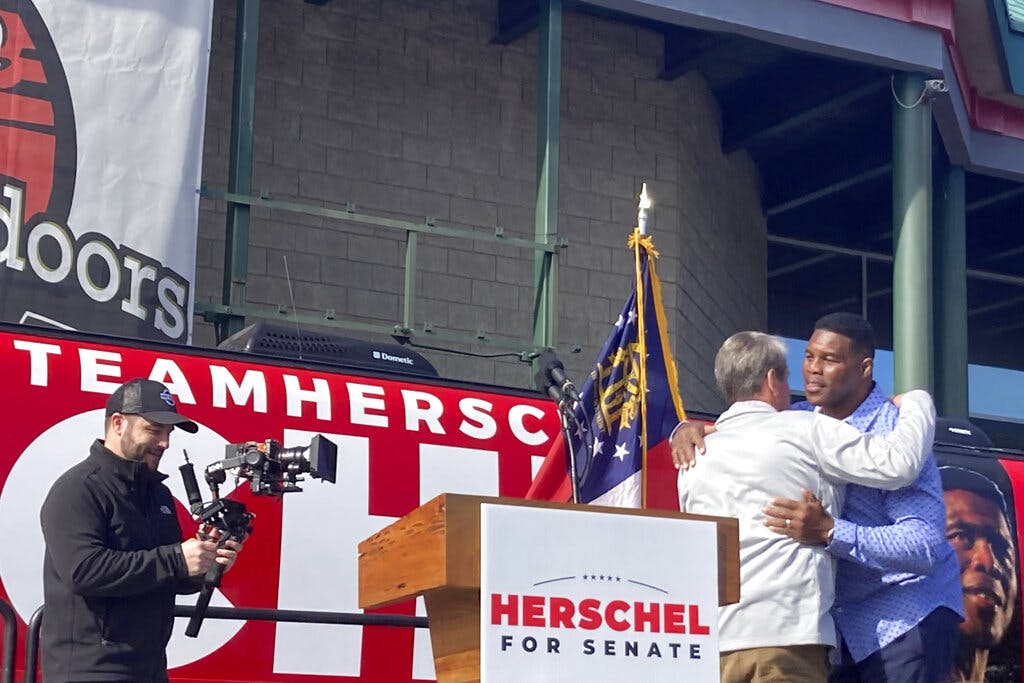Biden Surrenders to Georgia’s Work-for-Medicaid Program
This comes at an opportune time for Herschel Walker, whose private sector experience offers him a chance to make a full-throated case for promoting work over welfare.

President Biden can no longer challenge a federal court’s ruling in favor of Georgia’s work requirement for Medicaid. The state now has an opportunity to reorient the relationship between citizens and their government even as Washington’s runaway spending causes inflation to rage and a December 8 Senate runoff looms.
Americans have long been sold on the idea that someone else should pay for health care. It started when businesses offered insurance as a perk to attract employees; then, government got involved by compelling coverage and offering programs like Medicare for seniors and Medicaid for the poor or disabled.
With the connection between those paying the bills and those receiving services severed, costs skyrocketed — and why wouldn’t they? I can tell you from my time in veterinary medicine that if Fido’s owners never saw a bill, we’d have charged $900 for flea baths.
In 1965, President Lyndon Johnson’s estimate for Medicare alone was $500 million a year. By 2005, according to the Department of Health and Human Services, it cost 10 times that. With the national debt at $31 trillion and record inflation being driven by Mr. Biden’s budget busting, such largess is unsustainable.
Concerns about price and sustainability — as well as the positive effect of incentivizing Americans to work — inspired the Department of Health and Human Services under President Trump to allow states to experiment with new innovations, a first for the federal government.
States began to seek waivers under Medicaid’s Section 1115, but late last year, the Biden administration rescinded the option. That left Georgia’s Republican governor, Brian Kemp, with two options, according to the Georgetown University Health Policy Institute. He could “implement a clean Medicaid expansion demonstration that was far more advantageous to the state” — covering about eight times as many people “with a much higher matching rate of federal funding” — or he could sue in defense of the notion that there is no free lunch.
In August, a district court judge, Lisa Godbey Wood, ruled in favor of Georgia, agreeing that the administration had exceeded its authority. The 60-day window for appeal to the 11th Circuit Court closed without action from the White House, which may have feared another loss, opening the door for more governors to try new things.
The Biden administration’s surrender comes at an opportune time for Georgia’s Republican nominee for Senate, Herschel Walker, who’s facing a runoff against the Democratic incumbent, Senator Warnock. Mr. Walker’s private sector experience offers him a chance to make a full-throated case for promoting work over welfare.
Mr. Kemp, who won re-election by a margin large enough to avoid a runoff, celebrated the ruling. “Despite the Left’s efforts to claw back good policy for partisan politics,” he tweeted, “this week the judiciary ruled the Biden Admin erred in striking down our innovative health care waiver which would better serve Georgians than a one-size-fits all Medicaid expansion.”
With Democrats making “Medicare for All” a rallying cry, the states are fulfilling their design as what an associate justice of the Supreme Court, Louis Brandeis, called “laboratories of democracy,” testing policies on the local level before rolling them out nationwide.
Predictions of widespread suffering echo those President Clinton faced in the ’90s after signing Republican welfare reform that included work requirements. At the time, a fellow Democrat, Senator Moynihan of New York, called it “the most brutal act of social policy since Reconstruction.”
Yet according to the Heritage Foundation’s Robert Rector in 2003, “After welfare reform, the black child poverty rate began dropping at a sharp and unprecedented rate, falling to 30 percent in 2001” after being stuck around 40 percent for half a century.
“Work” is a four-letter word, but not a dirty one. While big spenders may benefit from giveaways at the ballot box, individuals denied the empowerment that comes from earning their daily bread remain mired in dependency for generations.
Stein’s Law, named for economist Herbert Stein, says, “If something cannot go on forever, it will stop.” Printing money to sustain the ballooning costs of programs like Medicaid cannot continue forever, and when it stops, Mr. Kemp’s policy may help ensure that Georgian’s have developed the skills to pay for their own lunch.

